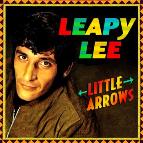There have been many brilliant songwriters in the last 100+ years, but only a handful are versatile enough to write outstanding, memorable songs both with a heart-warming nature as well as novelty ones . Bob Merrill is one that springs to mind, he wrote People as definitively recorded by Barbra Streisand and he also wrote How Much Is That Doggie in The Window. Ray Stevens is another with songs like Everything Is Beautiful and The Streak. Today, I focus on Albert Hammond, whose credits include The Air That I Breathe, Don’t turn Around, Nothing’s Gonna Stop Us Now and, on the lighter side, I’m A Train and Little Arrows.
Albert was born in London in 1944 after his family were evacuated from Gibraltar during World War II although he moved back there soon after the war. By his own admission, at the outset of his performing career Hammond played and sang in a Moroccan strip club, but in 1958 he and a friend, Richard Cartwright, began performing as a duo on the island and in Spain. Hammond become reasonably proficient on the guitar and was a more than fair singer, and they were good enough as a duo that they eventually became the core of a band called the Diamond Boys. His first success on these shores where with Family Dogg, a band he had formed in 1966 but had to wait three years for their only hit A Way of Life. In the latter part of the 60s he teamed up with Mike Hazelwood for a long and fruitful songwriting partnership which gave us hits like Make Me An Island and You’re Such A Good Looking Woman (Joe Dolan), Good Morning Freedom (Blue Mink), Gimme Dat Ding (Pipkins), Freedom Come Freedom Go (Fortunes), with other songwriting partner he gave us When I Need You (Leo Sayer) and One Moment In Time (Whitney Houston) among many others. However his first UK hit as a writer was the novelty ditty Little Arrows in 1968.
Albert said, “I was working at a Chelsea Drug Store just doing dishes and sometimes I’d carry around a little transistor radio and play it to the other guys when the song came on but they’d never believe it was me.” In the mid sixties, there was a budding Eastbourne-based singer called Graham Pulleyblank who was a jack of all trades, he’d been a comedian, an antique dealer, a fruit seller and even a bingo caller in Shepherd’s Bush, but he was a friend of Ray Davies of the Kinks and Ray’s brother Dave used to occasionally lay down backing tracks for Graham to sing to. He was once a member of the Urchin Skiffle Band but wanted to try a solo career and changed his name to Lee Graham before he used the moniker Leapy Lee, a nickname he was given at school because he was always leaping up and down. “I met Leapy Lea in a bingo hall in Shepherds Bush and gave him the song because he said he was a singer and I couldn’t get anyone else to record it,” Albert told me in an interview last week. Lee’s cheeky, slightly sideways, smile and massive sideburns, got him noticed and led to an appearance on The Beat Club which in turn led to Top of the Pops. It reached number 18 in the US but soared to number two in the UK only kept off the top by Mary Hopkin’s Those Were the Days. It also topped the chart in 18 other countries charts and sold over four million units.
He was seemingly a one hit wonder although his next song, Good Morning, just scraped into the UK top 30 in early 1970. Then his singing career came to an abrupt end when, following a fracas in a bar with Alan Lake, the husband of the actress Diana Dors in which the pub owner got stabbed. I always wondered if he ever thought about the extraordinary foresight of the lyrics of Little Arrows which said, ‘little arrows in your clothes’ as he spent two years at Her Majesties pleasure.
After leaving prison he moved to Saudi Arabia with the view to opening his own bar, but on realising that was probably not a good idea he went off to Spain when he remains to this day. In 1985 he published his autobiography Anyone Who Doesn’t Want to Take Their Clothes Off Can Leave!’ and in the late 90s he got a co-presenting job on the English TV show Passport to the Sun. He is also a regular contributor to the Euro Weekly News, an English newspaper published in Spain.
As a hitmaker, Albert Hammond, managed one UK hit as an artist when his hit The Free Electric Band went top 20 in 1973. As a songwriter he has written or co-written 39 UK hits, 18 of them making the top 20 and four number ones.
He has continued working into the 21st century, including the album, Revolution of the Heart in 2005. It was around that time that his classic ’70s albums began getting reissued on CD for the first time. He has been followed into music in the 21st century by his son, guitarist Albert Hammond, Jr. who is a member of the Strokes.
